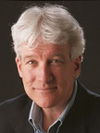| Home | Blog | Ask This | Showcase | Commentary | Comments | About Us | Contributors | Contact Us |

America under Bush is almost unrecognizableDISCUSSIONS | June 156, 2006Bill Schiller, Toronto 2006 Nieman fellow, was foreign editor at the Toronto Star and previously the Star’s correspondent in Johannesburg, Berlin and London before his Nieman year From the Canadian perspective – and we are unique among nations for our front row seat – today’s America under the leadership of President George W. Bush is almost unrecognizable from the America we knew under previous administrations. The nation seems so riven now by divisions between left and right, red and blue, Republican and Democrat, many Canadians wonder: who actually speaks for America? It isn’t just the internal divisiveness that disturbs, it’s America’s relinquishing of the very democratic norms for which it has rightly held the world’s respect and admiration: free speech and the rule of law. I remember being stunned during the Presidential campaign of 2004 to learn that in venues where the President came to speak, “free speech zones” had been allocated – conveniently out of earshot from the campaigning incumbent – complete with fencing. I remember thinking, “can this really be happening in America?” I had always thought, as all Canadians do, that America itself is a free speech zone, that one of the distinguishing characteristics of the land of liberty was the right to speak one’s mind. What stunned me more was the scant media attention the phenomenon received – even after the ACLU filed suit – and how Americans took it lying down. The election campaign continued with Presidential appearances becoming “ticketed events” with all attendees screened prior to admission. “Is this America?” I wondered. This America, an America that brooks no dissent, seems a perversion of the America we know, where discussion, fierce debate and the free exchange of ideas has long been a fundamental source of American strength. From our perch, “national security” seems to trump all in the post-9/11 era, even Americans’ most basic freedoms. How easy it was then for the administration – with a complacent press mistakenly thinking it was honoring national security in a time of war – to move from “free speech zones” to wide-scale wiretapping. When Canadians look south, we have always seen a nation that stands for “life, liberty and the pursuit of happiness,” a beacon of democracy for the world. Increasingly, however, when America is discussed in Canada the subjects that now spring to mind are torture, extraordinary rendition and wiretaps. During a recent BBC radio broadcast, a spokesperson for the U.S. State Department expressed America’s deep-seated concern about human rights in Iran. The BBC anchor replied saying that under normal circumstances, such U.S. concerns would be both sound and credible – except for four words: “Guantanamo Bay, Abu Ghraib.” Tragically – and this goes for some of America’s most distinguished foreign affairs commentators – America has yet to appreciate the incalculable damage torture, inflicted in its name, has done to its image abroad. It has been devastating. And yet a recent poll shows that some 63 per cent of Americans believe torture is justified in certain circumstances. Canadians find this shocking. America is right to be concerned about its national security. But it should not be so frozen by fear that it forsakes its fundamental values. Abandon free speech and the rule of law and you abandon America. In another time, facing another crisis Franklin Roosevelt made it plain when he warned that the only thing Americans had to fear was fear itself. That warning ought to have profound resonance today.
|



